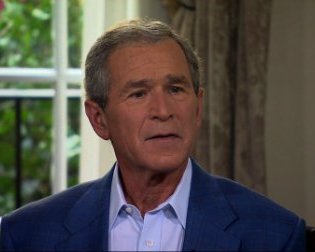 Two of President Barack Obama's White House predecessors offered their views of his impending decision on Syria Friday as global support for strikes in the country faltered.
Two of President Barack Obama's White House predecessors offered their views of his impending decision on Syria Friday as global support for strikes in the country faltered.
Former President George W. Bush, in an interview, said Obama has a "touch choice to make" on potential U.S. military action against Syrian President Bashar al-Assad, who is accused of using chemical weapons against civilians.
"If he decides to use our military, he'll have the greatest military ever backing him up," Bush said in an appearance on Fox News.
The United States and major allies are currently weighing major military action against Assad, though on Thursday British lawmakers voted against joining a global coalition. U.S. officials said after the vote that taking unilateral action against Syria was a possibility.
That option, former President Jimmy Carter said Friday, would be a grave mistake.
"A punitive military response without a U.N. Security Council mandate or broad support from NATO and the Arab League would be illegal under international law and unlikely to alter the course of the war," he wrote in a statement. "It will only harden existing positions and postpone a sorely needed political process to put an end to the catastrophic violence."
Carter, in his post-presidency, has engaged in global diplomacy in North Korea and the Middle East, and was a vocal critic of the Iraq War.
In his statement, Carter said the use of chemical weapons in Syria was a "a grave breach of international law" but that any U.S. action in the country should wait for ongoing investigations by United Nations inspectors to conclude.
"All should seek to leverage the consensus among the entire international community, including Russia and Iran, condemning the use of chemical weapons in Syria and bringing under U.N. oversight the country's stockpile of such weapons," he wrote.
Bush, in the Friday interview, was less forthcoming in his views on Syria. A Republican, he led the United States into two wars during his presidency: in Afghanistan in 2001 and Iraq in 2003. Many say those wars, particularly in Iraq, have contributed to nationwide war fatigue. A poll released Friday showed half of Americans oppose potential U.S. military action in Syria, though support increased when possible action was limited to cruise missile strikes.
On Wednesday, Bush's Defense Secretary Donald Rumsfeld said Obama had yet to fully justify any military action in Syria. Rumsfeld led the Pentagon during the invasion of Afghanistan and Iraq.
"There really hasn't been any indication from the administration as to what our national interest is with respect to this particular situation," he said. "When you think about what's really important in that region - it's Iran's nuclear program and the relationship between Iran and Syria, the Assad regime, with respect to terrorists that go around killing innocent men, women and children, including Americans."
Bush said Friday he was "not a fan" of Assad.
"He's an ally of Iran, he's made mischief," he said, declining to speculate any further about the decisions currently looming over the White House.
Bush, who earlier this month underwent a procedure to have a stent placed in his heart, appeared healthy during the interview and said he was feeling "pretty good." He was interviewed at the Dallas National Gold Club, where he was helping launch a gold tournament that raises money for veterans.
"I wish I was a teenager so I could be out on my mountain bike today," he said. "But I'm slowly recovering."
Portland and Seattle
Free Subscription to Breaking News
Free Subscription to Breaking News























































































































































































































































































































































